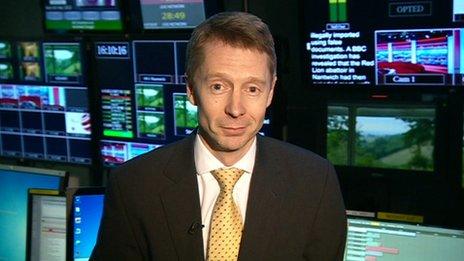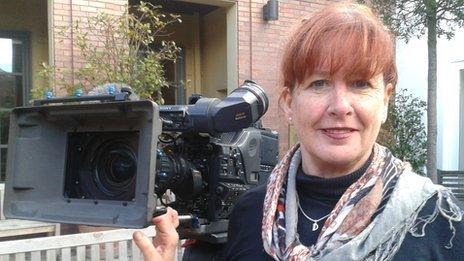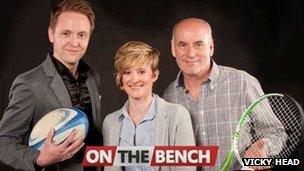Local TV follows in news bunny's footsteps
- Published

Manchester's Channel M featured Andy Crane reading the news
A new era in local TV is due to start when Grimsby's Estuary channel is launched on Freeview later this month, the first of 19 US-style local stations across the UK.
In the past, local channels have failed to attract audiences and advertisers - so why should it be any different this time round?
Audiences may remember the news bunny, the bikini-clad weather forecaster and topless darts, but L!VE TV failed to attract viewers in enough numbers - despite broadcasting hyper-local content.
Gary Hudson, a managing editor at the short-lived cable network in the late-1990s, said: "Local TV didn't work, either in terms of audience numbers or revenues, when most people only had a choice of five channels.
"So why should it work when people now have a choice of 500?"
Apart from news and gimmicks, Mr Hudson remembered sports phone-ins and sponsored programmes, including a DIY show with a wooden flooring company.
Audience figures were in the "tens of thousands", but the station was starting to make money when it was closed by Trinity Mirror in 1999.
Mr Hudson, an ex-BBC Midlands Today correspondent added: "People always say they want more local TV and radio and [then] don't watch or listen to it."

The news bunny was a regular on LIVE TV!
So there was scepticism from some quarters when then Culture Secretary Jeremy Hunt insisted that there was an appetite for local television in the UK.
Andy Crane, who became famous introducing BBC children's programmes alongside puppet Edd the Duck, presented on Manchester's Channel M for six years up until live programming stopped in 2010.
"It was like the Manchester Evening News [newspaper] on your TV," he said.
"It's what regional TV can't do… We were doing really local stories [which] might make the Stockport Advertiser."
The presenter, now heard on BBC Radio Manchester and Sheffield, said the recession "scuppered us as much as anything else".
He said: "Producing local TV of sufficiently high quality, it's hard. [Viewers] expect the standard as on Sky and the BBC. If not, they'll go away."
The first group of new channels includes Birmingham's City TV, which hopes to go on air in the middle of next year.
Chief executive Debra Davis said she believed it would succeed because the amount of people with Freeview outstrips the number of people with access to cable the first time around.
She added: "Cable 15, 20 years ago didn't have the penetration that Virgin has now.
"Even if you had 200 channels, if you want to hear about Birmingham, you're going to have to tune to us.
"[Also] I think the technology is a lot more affordable, the equipment and small cameras that people use."
Another difference is that City TV will be available online and on mobile devices.
Ms Davis said: "Think about all of the different Midlanders who actually live abroad… They're going to want to know what's going on in this city."

Chief executive Debra Davis is planning City TV's output in Birmingham
The BBC will acquire up to £5m of content from the new local TV services each year over three years - a cash boost for the new providers.
Estuary TV, the non-profit-making station in Grimsby, has been broadcasting on cable for the past 15 years as Seven. It has a turnover of about £250,000, including the £25 it gets from each peak-time advert.
News editor Emma Lingard, one of eight full-time staff, said it would broadcast local output 18 hours a day but plenty of old shows would be repeated, such as local history, youth and men's health programmes.
Mrs Lingard will read the 15-minute early evening news, while political discussion shows, sport and a Friday entertainment show are also scheduled, with up to 50 local media students possibly getting involved.

Estuary TV's Freeview output will include sports show On The Bench
She said: "[We've had] a mix of volunteer presenters. People loved it and we've continued doing that… They are very keen to engage to make programmes.
"People say, 'come and film our shop', 'we've got a great story to do'… It gives you a big buzz. The people want you."
And after the news bunny, what about Birmingham now?
City TV plans 27 hours a week of news and current affairs and 14 hours of other local material, including lifestyle output, a school quiz and music programmes.
Ms Davis said: "If we do a couple of local children shows, who knows there may be some licensing and merchandising involved?"
- Published31 October 2013
- Published3 September 2013
- Published17 April 2012